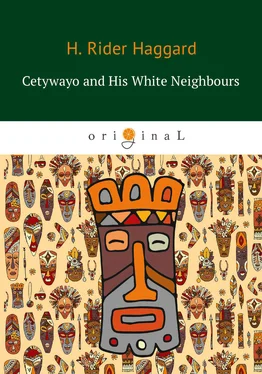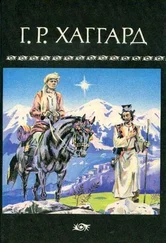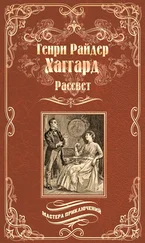Генри Райдер Хаггард - Cetywayo and His White Neighbours
Здесь есть возможность читать онлайн «Генри Райдер Хаггард - Cetywayo and His White Neighbours» — ознакомительный отрывок электронной книги совершенно бесплатно, а после прочтения отрывка купить полную версию. В некоторых случаях можно слушать аудио, скачать через торрент в формате fb2 и присутствует краткое содержание. Город: Москва, Год выпуска: 2018, ISBN: 2018, Жанр: literature_19, Публицистика, на английском языке. Описание произведения, (предисловие) а так же отзывы посетителей доступны на портале библиотеки ЛибКат.
- Название:Cetywayo and His White Neighbours
- Автор:
- Жанр:
- Год:2018
- Город:Москва
- ISBN:978-5-521-06635-3
- Рейтинг книги:3 / 5. Голосов: 1
-
Избранное:Добавить в избранное
- Отзывы:
-
Ваша оценка:
- 60
- 1
- 2
- 3
- 4
- 5
Cetywayo and His White Neighbours: краткое содержание, описание и аннотация
Предлагаем к чтению аннотацию, описание, краткое содержание или предисловие (зависит от того, что написал сам автор книги «Cetywayo and His White Neighbours»). Если вы не нашли необходимую информацию о книге — напишите в комментариях, мы постараемся отыскать её.
Sir Henry Rider Haggard was an English writer of adventure novels set in exotic locations, predominantly Africa, and a pioneer of the Lost World literary genre.
Cetywayo and His White Neighbours — читать онлайн ознакомительный отрывок
Ниже представлен текст книги, разбитый по страницам. Система сохранения места последней прочитанной страницы, позволяет с удобством читать онлайн бесплатно книгу «Cetywayo and His White Neighbours», без необходимости каждый раз заново искать на чём Вы остановились. Поставьте закладку, и сможете в любой момент перейти на страницу, на которой закончили чтение.
Интервал:
Закладка:
I do not propose to follow out all the details of the boundary dispute between Cetywayo and the Transvaal, or to comment on the different opinions held on the point by the various authorities, English and Zulu. The question has been, for the moment, settled by the Transvaal Convention, and is besides a most uninteresting one to the general reader.
Nor shall I enter into a discussion concerning the outrages on which Sir Bartle Frere based his ultimatum previous to the Zulu war. They were after all insignificant, although sufficient to serve as a casus belli to a statesman determined to fight. The Zulu war was, in the opinion of Sir B. Frere, necessary in self-defence, which is the first principle of existence. If it admits of justification, it is on the ground that the Zulu army was a menace to the white population of South Africa, and that it was therefore necessary to destroy it, lest at some future time it should destroy the whites. It is ridiculous to say that the capture of two Zulu women in Natal and their subsequent murder, or the expulsion on political grounds of a few missionaries, justified us in breaking up a kingdom and slaughtering ten thousand men. Sir Bartle Frere declared war upon the Zulus because he was afraid, and had good reason to be afraid, that if he did not, Cetywayo would before long sweep either the Transvaal or Natal; whilst, on the other hand, the Zulus fought us because our policy was too philanthropic to allow them to fight anybody else. This statement may appear strange, but a little examination into Zulu character and circumstances will, I think, show it to be correct.
It must be remembered that for some years before Panda’s death the Zulus had not been engaged in any foreign war. When Cetywayo ascended the throne, it was the general hope and expectation of the army, and therefore of the nation, that this period of inaction would come to an end, and that the new king would inaugurate an active foreign policy. They did not greatly care in what direction the activity developed itself, provided it did develop. It must also be borne in mind that every able-bodied man in the Zulu country was a member of a regiment, even the lads being attached to regiments as carriers, and the women being similarly enrolled, though they did not fight. The Zulu military system was the universal-service system of Germany brought to an absolute perfection, obtained by subordinating all the ties and duties of civil life to military ends. Thus, for instance, marriage could not be contracted at will, but only by the permission of the king, which was generally delayed until a regiment was well advanced in years, when a number of girls were handed over to it to take to wife. This regulation came into force because it was found that men without home ties were more ferocious and made better soldiers, and the result of these harsh rules was that the Zulu warrior, living as he did under the shadow of a savage discipline, for any breach of which there was but one punishment, death, can hardly be said to have led a life of domestic comfort, such as men of all times and nations have thought their common right. But even a Zulu must have some object in life, some shrine at which to worship, some mistress of his affections. Home he had none, religion he had none, mistress he had none, but in their stead he had his career as a warrior, and his hope of honour and riches to be gained by the assegai. His home was on the war-track with his regiment, his religion the fierce denunciation of the isanusi, [5] Witch-doctor. These persons are largely employed in Zululand to smell out witches who are supposed to have bewitched others, and are of course very useful as political agents. Any person denounced by them is at once executed. A friend of the writer’s was once present at a political smelling-out on a large scale, and describes it as a very curious and unpleasant scene. The men, of whom there were some thousands, were seated in a circle, as pale with terror as Zulus can be. Within the circle were several witch doctors; one of whom amidst his or her incantations would now and again step forward and touch some unfortunate man with a forked stick. The victim was instantly led away a few paces and his neck twisted. The circle awaited each denunciation in breathless expectation, for not a man among them knew whose turn it might be next. On another occasion, an unfortunate wretch who had been similarly condemned by an isanusi rushed up to the same gentleman’s waggon and besought shelter. He was hidden under some blankets, but presently his pursuers arrived, and insisted upon his being handed over. All possible resistance was made, until the executioners announced that they would search the waggon and kill him there. It was then covenanted that he should have a start in the race for life. He was, however, overtaken and killed. These instances will show how dark and terrible is the Zulu superstition connected with witchcraft, and what a formidable weapon it becomes in the hands of the king or chief.
and his affections were fixed on the sudden rush of battle, the red slaughter, and the spoils of the slain. “War,” says Sir T. Shepstone, in a very remarkable despatch written about a year before the outbreak of the Zulu war, “is the universal cry among the soldiers, who are anxious to live up to their traditions,… and the idea is gaining ground among the people that their nation has outlived the object of its existence.” Again he says, “The engine (the Zulu military organisation) has not ceased to exist or to generate its forces, although the reason or excuse for its existence has died away: these forces have continued to accumulate and are daily accumulating without safety-valve or outlet.”
Desirable as such a state of feeling may be in an army just leaving for the battlefield, it is obvious that for some fifty thousand men, comprising the whole manhood of the nation, to be continually on the boil with sanguinary animosity against the human race in general, is an awkward element to fit into the peaceable government of a state.
Yet this was doubtless the state of affairs with which Cetywayo had to contend during the latter years of his reign. He found himself surrounded by a great army, in a high state of efficiency and warlike preparation, proclaiming itself wearied with camp life, and clamouring to be led against an enemy, that it might justify its traditions and find employment for its spears. Often and often he must have been sorely puzzled to find excuses wherewithal to put it off. Indeed his position was both awkward and dangerous: on the one hand was Scylla in the shape of the English Government, and on the other the stormy and uncertain Charybdis of his clamouring regiments. Slowly the idea must have began to dawn upon him that unless he found employment for the army, which, besides being disgusted with his inactivity, was somewhat wearied with his cruelties, for domestic slaughter had ceased to divert and had begun to irritate: the army, or some enterprising members of it, might put it beyond his power ever to find employment for it at all, and bring one of his brothers to rule in his stead.
And yet who was he to fight, if fight he must? There were three possible enemies – 1. The Swazis; 2. The Transvaal Boers; 3. The English.
Although the English may have held a place on Cetywayo’s list as possible foes, there is no ground for supposing that, until shortly before the war, he had any wish to fight with us. Indeed, whereas their hatred of the Boers was pronounced, and openly expressed, both the Zulu king and people always professed great respect for Englishmen, and even a certain amount of liking and regard.
Therefore, when Cetywayo had to settle on an enemy to attack, it was not the English that he chose, but the Swazis, whose territory adjoined his own, lying along the borders of the Transvaal towards Delagoa Bay. The Swazis are themselves Zulus, and Cetywayo claimed certain sovereign rights over them, which, however, they refused to recognise. They are a powerful tribe, and can turn out about 10,000 fighting men, quite enough for Cetywayo’s young warriors to try their mettle on. Still the king does not appear to have wished to undertake the war without first obtaining the approval of the Natal Government, to whom he applied several times for permission “to wash his spears,” saying that he was but half a king until he had done so. The Natal Government, however, invariably replied that he was on no account to do anything of the sort. This shows the inconveniences of possessing a complimentary feudal hold over a savage potentate, the shadow of power without the reality. The Governor of Natal could not in decency sanction such a proceeding as a war of extermination against the Swazis, but if it had occurred without his sanction, the Swazis would have suffered no doubt, but the Zulu spears would have been satisfactorily washed, and there would have been no Zulu war. As it is, Englishmen have been killed instead of Swazis.
Читать дальшеИнтервал:
Закладка:
Похожие книги на «Cetywayo and His White Neighbours»
Представляем Вашему вниманию похожие книги на «Cetywayo and His White Neighbours» списком для выбора. Мы отобрали схожую по названию и смыслу литературу в надежде предоставить читателям больше вариантов отыскать новые, интересные, ещё непрочитанные произведения.
Обсуждение, отзывы о книге «Cetywayo and His White Neighbours» и просто собственные мнения читателей. Оставьте ваши комментарии, напишите, что Вы думаете о произведении, его смысле или главных героях. Укажите что конкретно понравилось, а что нет, и почему Вы так считаете.
